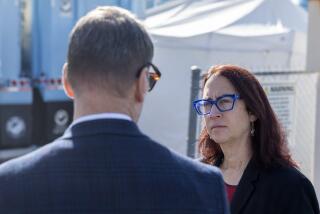Friedman Appointment as Bush Advisor Put Off for a 2nd Day
- Share via
WASHINGTON — A leading Wall Street figure who was poised to become a senior economic advisor to President Bush found himself the target of fierce lobbying Tuesday by conservative activists who charge that he is insufficiently enthusiastic about tax cuts to serve in the post.
For a second day, the activists managed to delay the White House’s appointment of former Goldman Sachs Chairman Stephen Friedman to head the National Economic Council, a spot vacated by the dismissal of Bush economic advisor Lawrence B. Lindsey. The president had been expected to announce Monday his choice of Friedman when he nominated John W. Snow as his new Treasury secretary.
The activists are particularly disturbed by Friedman’s role as a director of the Concord Coalition, a bipartisan group that crusades against federal budget deficits.
In choosing to pick a fight over the matter, they exposed a deep rift between the anti-deficit and pro-growth wings of the Republican Party that could spell big trouble for Bush and GOP congressional leaders in trying to sell a new round of tax cuts early next year.
“Our No. 1 objection to Friedman is that he has never really been part of the supply-side, pro-growth club,” said anti-tax activist Stephen Moore.
“There’s no indication he has a supply-side bone in his body,” he said.
Moore heads the renegade political action committee Club for Growth, which has financed successful campaigns that led to defeats of moderate Republican lawmakers by conservative upstarts.
Opposition to the 63-year-old Friedman, now a senior principal with the private investment firm of Marsh & McLennan Capital Inc., appears to reflect growing conservative nervousness that Bush is tacking to the political center in dismissing Lindsey and tapping Snow for the top Treasury post.
Lindsey is widely respected on the right for helping to sell last year’s $1.35-trillion tax cut and writing a book-length defense of former President Reagan’s supply-side tax cuts of the early 1980s.
Snow, as chairman of the rail giant CSX Corp. and head of the Business Roundtable in the 1990s, lobbied for the deficit deals that included tax increases as well as spending reductions.
The objections to Friedman followed what is by now a well-trod pattern with Moore spinning out quotes in Washington while Thomas “Dusty” Rhodes, president of the conservative National Review, and television commentator Lawrence Kudlow worked conservative circles in New York.
Kudlow devoted much of CNBC-TV’s “Kudlow & Cramer” show Monday night, as well as an online column, to criticism of the New York investment banker.
By Tuesday morning, National Review’s Web site carried a banner reading, “Warning to Bushies: DUMP Friedman! He’s no tax cutter.” The Wall Street Journal editorialized that it hopes “someone has vetted his policy convictions,” given his role with the Concord group.”
Administration officials, who appeared caught off-guard by the vehemence of the objections, responded testily.
One official, who spoke only on condition of anonymity, described Moore as “a cable TV gadfly, and not a serious force affecting this administration’s deliberations.” White House spokeswoman Claire Buchan could not say when a replacement for Lindsey would be named.
Friedman appeared to have the job of heading the NEC locked up over the weekend when he was being described as a “Republican Bob Rubin,” a reference to the Clinton administration’s widely respected Treasury secretary.
Friedman and Rubin jointly ran Goldman Sachs from 1990 to 1992.
Though Friedman has given generously -- and almost exclusively -- to Republican candidates, activists excoriated his contribution of $500 to Hillary Rodham Clinton’s successful 2000 Senate campaign and another $500 to an abortion rights group.
In addition, White House officials said privately Friedman was having trouble unwinding his complex personal finances in order to take public office, and there were reports that he is suffering from unspecified medical problems. Friedman has not commented.
The administration is widely reported to be readying another $300 billion of tax cuts -- that would come atop its already passed $1.35-trillion tax package -- aimed at rekindling growth and shrinking the size of government.
The administration proposal is certain to face substantial opposition from Democrats and deficit-hawk Republicans like Sens. Pete Domenici of New Mexico and Charles Grassley of Iowa, the incoming chairman of the Senate Finance Committee.
It is also likely to be criticized by most mainstream economists who fear that Washington’s swing from multi-hundred-billion-dollar surpluses to similar-sized deficits will damage an already weak economy by driving up interest rates and dampening what growth there is.
Conservatives worry that once in the NEC job, Friedman would not work to sell the new cuts to Congress and the public, but instead follow in the footsteps of ousted Treasury Secretary Paul H. O’Neill and raise doubts about the tax package.
“This is a man who gives the impression that he does not believe in what the president is doing,” said prominent conservative economist Richard W. Rahn.
“The president is on the side of growth, but I’m not sure (Friedman) is,” he said.
Moore, asked whether conservatives risk widening the divide between deficit hawks and supply-side Republicans by fighting Friedman’s appointment, quipped, “It might have a decade ago, but now this is a supply-side party.
“Everybody is a supply-sider.”
More to Read
Sign up for Essential California
The most important California stories and recommendations in your inbox every morning.
You may occasionally receive promotional content from the Los Angeles Times.













